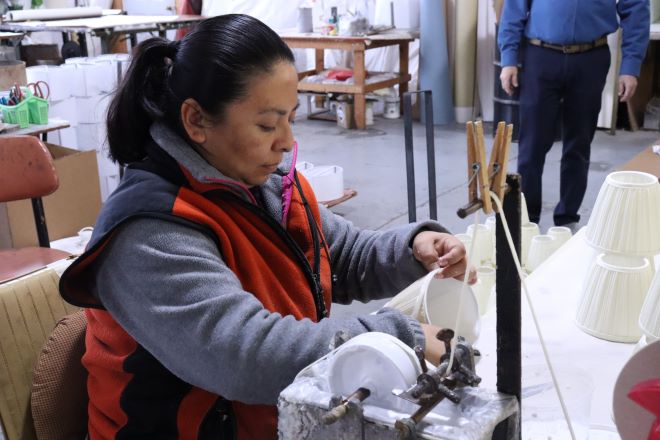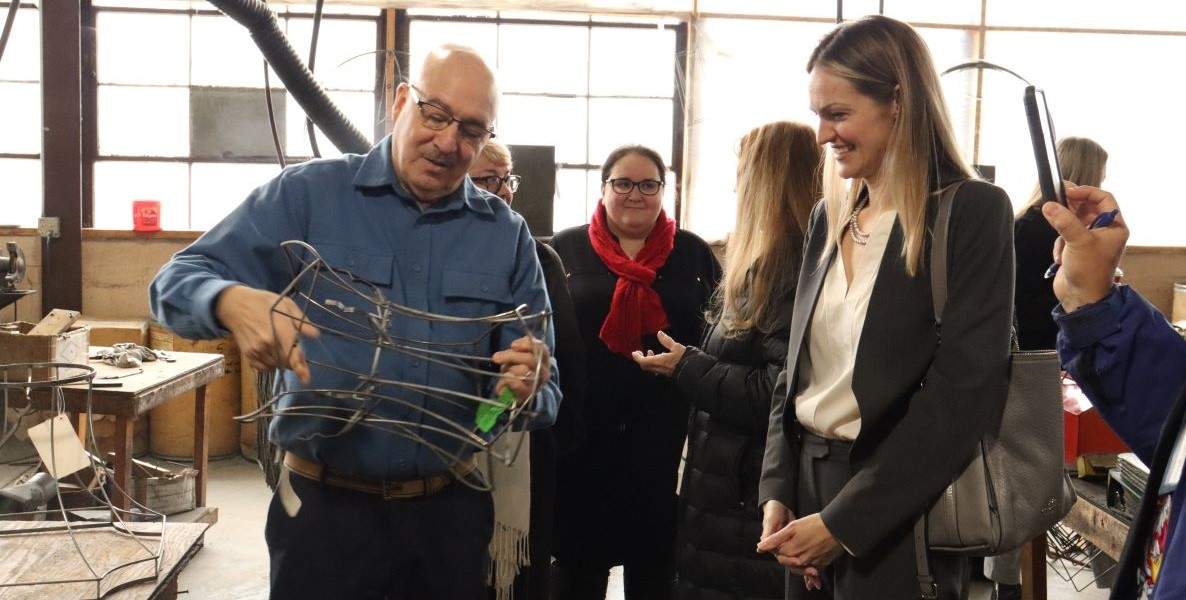Business hasn’t reached pre-Covid levels, and inflation has hit hard, but hourly workers at a Scranton lighting factory still got significant pay bumps this year — an extra $4 per hour. The wage increase, in most cases, pushed each employee’s hourly pay to $18 — almost triple the state’s minimum wage. Penn Shadecrafters owner Steve Carter believes paying his workers more has helped retain employees and kept the lighting factory’s … lights on.
The raises came from an unexpected source: a $50,000 Wage Boost Grant from the city of Scranton itself, taken from the city’s share of 2021 American Rescue Plan Act dollars.
“The labor situation today makes it very difficult to attract employees, especially when big box wholesalers are offering starting salaries in excess of $20 an hour. There’s always the fear an employee will go elsewhere for a better wage,” says Carter, who says eight of his 10 employees are paid by the hour. “This has allowed local businesses like ours to increase wages closer to state and national rates.”
As costs continue to rise, the difference between Pennsylvania’s paltry minimum wage and the ability to support a family grows more stark.
The Commonwealth’s minimum wage of $7.25/hour — which is the federal minimum established by Congress more than a decade ago — is not a living wage. And as costs continue to rise, the difference between that paltry wage and the ability to support a family grows more stark. By boosting wages, the Scranton program helps close that gap, making it possible for families to pay their existing bills and, ideally, allowing them to start building savings. That, in turn, makes it more likely citizens will be able to afford living and working in Scranton, helping the city maintain its tax base and make longer-term improvement plans.
Scranton businesses that receive the grant commit to using the money to raise hourly wages and to maintaining or increasing that wage over a three-year period. In the first year, the grants fully fund the increases. In the second, the grant covers half of the wage hike, and the recipient business promises to pay the rest. In the third year, grant-recipient businesses are responsible for the full pay hike.
At that point, the theory goes, the businesses should have more cash on hand because of the savings that comes from retaining trained employees and the additional profits they can expect as the nation’s business sector continues to recover and grow.
Scranton Mayor Paige Gebhardt Cognetti says leaders in other cities have expressed interest in using their ARPA funds, which must be spent by 2026, in a similar manner after she gave a presentation on the Wage Boost Grant program earlier this year at a U.S. Conference of Mayors meeting. That’s because many cities struggle with the same issue as Scranton, where wages are lower than the state average, but the cost of living is on par with the Commonwealth.
“There’s a real wage gap,” Cognetti says. “We looked at the data and, by boosting wages, we get a triple win: Businesses retain employees, employees can keep up with the cost of living and the city retains businesses.”
A grant that just “makes sense”
The American Rescue Plan was a $1.9 trillion economic stimulus bill signed by President Biden in March, 2021. A portion of that — $350 billion – was set aside for state and local government shortfalls. Scranton, a city of about 75,000, was awarded $68.7 million.
As of May 1, Scranton has dispersed $775,770 to 13 for-profit businesses across all of its ARPA small business programs. Only one recipient, Penn Shadecrafters, has been cleared for a $50,000 Wage Boost grant to date, but Scranton officials plan to announce more as early as this month, following a thorough application review process.
Cognetti says the fact that ARPA dollars came directly to cities, instead of being filtered through the Commonwealth, allowed her team to “tailor our programs to what our city needs.”
“These dollars are only as good as the impact they have,” she says. “A local coffee shop (owner) said, We’ve gotten a lot of help to recover from the pandemic, and this grant just makes sense. It seems to be getting to the heart of the problem for many different businesses.”
“By boosting wages, we get a triple win: Businesses retain employees, employees can keep up with the cost of living and the city retains businesses.” — Scranton Mayor Paige Gebhardt Cognetti
The city fine-tuned the Wage Boost Grant program with input from Malvern-based The Institute, a non-profit research and data analysis group serving Northeastern Pennsylvania. Teri Ooms, its president and CEO, says her organization’s research has shown that a few extra dollars per hour can greatly affect a struggling family.
“People earning minimum wage … often can’t get social supports,” Ooms says. “They’re trying to do the right things, but they still have to make choices between food or medicine, rent or utilities.”
The Wage Boost Grant program is designed to help the working poor not only cover their expenses but also, hopefully, allow them to save money and “build a little bit of a nest egg,” Ooms says.
The Institute is helping Scranton study the program, to see how it impacts residents of the city and surrounding areas.
U.S. Senator Bob Casey says the Scranton program is “a model for the Commonwealth and the entire nation.” The ARPA, he says, was passed “to uplift working families and help small businesses get back on their feet and get ahead, and that is exactly what the City is using the Rescue Plan funding to do. Raising wages for workers benefits everyone: Families earn more, businesses retain and hire more workers, and our communities thrive.”

Why Philly needs a wage boost
The latest data from the U.S. Bureau of Labor Statistics, released in April, found that wages and salaries in the Philadelphia region increased by 6.5 percent in the last year — higher than any other metropolitan area in the country. (The metro area includes Camden and Wilmington, as well as Philadelphia.) But that varies by race and Philly workers started at a significant deficit: A 2019 report from the Center City District found that a disproportionately high number of jobs at that time — about 60.5 percent — paid $35,000 or less annually. That was twice the national average of 29 percent of new jobs falling into the $35,000 or less category.
Meanwhile, around 23 percent of Philadelphians live below poverty — $25,000 for a family of four. Housing prices in Philadelphia continue to rise, and nearly 49 percent of households are “cost burdened,” which means they spend at least 30 percent of their income on rent, according to Pew Charitable Trust’s 2023 State of the City.
And with some of the highest wage taxes in the country, raising salaries can be difficult, especially for small businesses. Devi Ramkissoon, executive director of the Sustainable Business Network of Greater Philadelphia, calls the Wage Boost a “forward thinking” program that could have great benefits in Philadelphia too.
“Raising wages for workers benefits everyone: Families earn more, businesses retain and hire more workers, and our communities thrive.” — U.S. Senator Bob Casey
A Philadelphia Wage Boost program would need a different source of funding. The city used some of its $1.4 billion in ARPA money to fund the Philadelphia Covid-19 Small Business Relief Fund, which distributed $13.3 million in grants and low-interest loans to more than 2,000 businesses. The remaining ARPA funds have been spread through the FY’24 and FY’25 budgets and will be spent by 2026. That is not to say there is not money in Philly’s $6 billion budget, or through a public-private partnership, for a program with triple benefits — to workers, businesses and the city.
Or, perhaps, a private or non-profit organization could launch a similar program in the city. Combining it with other efforts — including Raise the Wage PA, a campaign to raise the Commonwealth’s current $7.25 minimum wage, and the City of Philadelphia Department of Commerce’s Quality Jobs program — “would have a profound impact on poverty, economic inequality, and attracting and retaining local businesses,” says Ramkissoon.
“Across the state, minimum wage hasn’t increased in over a decade and that makes it much harder for individuals and families to scrape by,” says Ramkissoon, whose non-profit organization supports businesses striving for the “triple bottom line: profit, people and the planet.” “A program like this is a good step forward while we work towards changes at the state level.”
It comes with risks — but, hopefully, more rewards
The biggest unknown in the Wage Boost Grant program is what will happen in its third year, when participating businesses are solely responsible for maintaining the higher hourly wage. While there is no penalty built into the program if the businesses fail to uphold their end of the bargain, “there are obvious risks for business owners … which places the importance of financial planning and preparation on them,” says Christopher Hughes, Scranton’s ARPA communication and information manager.
Critics of the program argue that a short-term wage boost is not the best use of the funds. They call it a wage freeze, perhaps because it asks employers to raise wages now and hold them over two years with ARPA funds. Hughes disagrees.
“Those critics underestimate the immediate impact this can have. A $1 hourly increase is an extra $40 per week for full-time employees. That’s almost $200 per month to pay bills, buy groceries, or treat their family to a night out at a restaurant,” he says. “The value of this economic mobility experiment is really important.”
Ooms notes that even a temporary wage boost can be a boon for struggling families, allowing them to meet basic needs, pay down bills or accumulate savings to help improve their prospects for sustained economic mobility.
“A $1 hourly increase is an extra $40 per week for full-time employees. That’s almost $200 per month to pay bills, buy groceries, or treat their family to a night out at a restaurant,” — Christopher Hughes
“If businesses can’t support it long term, hopefully employees are notified in plenty of time so they can look for employment elsewhere,” she says, noting that projections say there will be more jobs than people over time.
Penn Shadecrafters’ Carter, whose father founded the lighting business in 1974, believes he’ll be able to maintain the boosted hourly wages in the program’s third year because he already projects his company’s 2023 sales, which are tied to the successes of the construction and hospitality industries, will surpass those from 2019. His company, which had two large factories making its products but has since consolidated the work to one, also plans to continue its regular practice of raising wages by 2 or 4 percent annually to keep up with the cost of living.
“Programs like this can encourage industries to come back to our country,” says Carter.
![]() RELATED STORIES ON JOBS AND WAGES FROM THE CITIZEN
RELATED STORIES ON JOBS AND WAGES FROM THE CITIZEN



